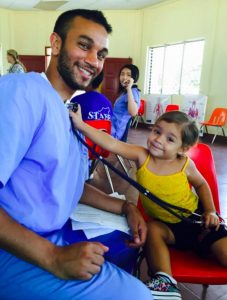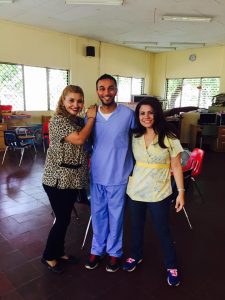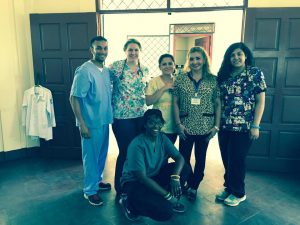
Milan Sheth is an alumnus of Eastern Mennonite University’s M.A. in Biomedicine program. Milan’s interests are in clinical/academic medicine and global health. He serves as an ambassador for International Service Learning and PreMed STAR. Milan advocates for students to gain experience in medically underserved areas. Milan intends to apply to medical school next year.
My classmates and I traveled to Nicaragua via International Service Learning (ISL). We provided an array of medical services to residents in both urban and rural areas. Upon arrival, I was swept away by Nicaragua’s natural beauty and the warm welcome we received. Our group leader, Adriana, greeted us at the airport and led us back to our lodging. Hotel Mozonte served as our home for the next 2 weeks.
The next day’s orientation gave me a sense of grounding in what I would do as we reviewed basic triage, vital signs, and learned medical Spanish. Our first assignments were to conduct house visits in San Isidro. We began our day by shyly knocking on doors, asking if anyone in the home wanted our free medical exam. The people were friendly and respectful, though some initially declined our offer. As some of the braver residents spoke with us, more and more individuals arrived to ask questions.
Some key characteristics of the families emerged out of our work. First, it was clear that families rarely saw a doctor. Locals reported that the hospital was too far for them to visit, and it was difficult to find transportation. Health characteristics of the people also became evident. Ailments included: respiratory issues, rashes, parasites, colicky babies, and high blood pressure. Many requested refills on prescriptions that other teams issued months ago.
After home visits, we set up a clinic in San Isidro. San Isidro was hit by flooding several years ago, leaving people with a damaged sense of safety and security. They were forced to evacuate, and many lost valuable possessions. Despite these troubles, people greeted us warmly and enthusiastically. On opening day, there was a line of people waiting for the clinic. Patients were excited to receive new supplies.
 The second clinic was in San Sebastian, a middle-class neighborhood in Managua that was built ten years ago. After our time in San Isidro, I was surprised that we set up a clinic in a more developed area. When I hesitantly asked about this, the doctor who worked with us stated that people here had few nearby medical facilities. The community builders did not plan for healthcare needs, and the nearest clinic was far away. This proved to be true in the next few days as we examined 60 patients. After this challenging, heartwarming, and heartbreaking experience, I was struck by how much Nicaragua impacted me. I hoped that our work left a small imprint of change on Nicaragua!
The second clinic was in San Sebastian, a middle-class neighborhood in Managua that was built ten years ago. After our time in San Isidro, I was surprised that we set up a clinic in a more developed area. When I hesitantly asked about this, the doctor who worked with us stated that people here had few nearby medical facilities. The community builders did not plan for healthcare needs, and the nearest clinic was far away. This proved to be true in the next few days as we examined 60 patients. After this challenging, heartwarming, and heartbreaking experience, I was struck by how much Nicaragua impacted me. I hoped that our work left a small imprint of change on Nicaragua!
